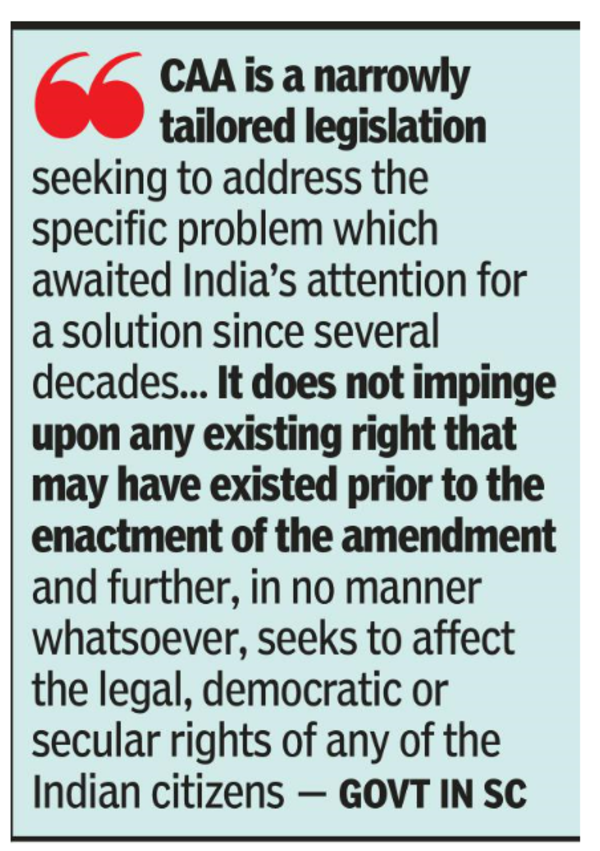A day before the hearing of a bunch of petitions challenging the CAA on the ground of exclusion of Muslims from the minorities permitted to get Indian citizenship if they had entered India on or before December 31, 2014, the government said, “The CAA is a narrowly tailored legislation seeking to address the specific problem which awaited India’s attention for a solution since several decades.”

It countered the objection that the law was discriminatory as Muslims have also faced persecution in several other countries. “The CAA does not seek to recognise or seek to provide answers to all or any kind of purported persecution that may be taking place across the world or that may have taken place previously anywhere in the world,” the government said, the assertion mirroring its defiant stand in the face of criticism and widespread protests.
Requesting the court to decide the validity of the CAA by taking cognizance of the persistent persecution of minority communities, specified in the CAA, in the three theocratic countries, it said, “Parliament, after taking cognizance of the said issues over the course of the past seven decades and having taken into consideration the acknowledged class of minorities in three specific countries, has enacted the present amendment.”
Simultaneously, it also underlined that the issue pertained to foreign policy, where the legislature and executive have a wider latitude. “The CAA does not impinge upon any existing right that may have existed prior to the enactment of the amendment and further, in no manner whatsoever, seeks to affect the legal, democratic or secular rights of any of the Indian citizens,” it said.
On the petitioners’ question about exclusion of Muslim immigrants already in India from the ambit of the CAA, the Centre said the SC must look into the provisions of the Assam Accord and the memorandum of settlement between the Government of Tripura and the All Tripura Tribal Force under which certain areas of Assam and Tripura have been excluded from being settled by CAA beneficiaries to protect the interests of ethnic minority communities and not to allow them to get swamped by immigrants.
“There is required to be a harmonious construction of the Assam Accord and the CAA as the CAA is a beneficial legislation intended for benefitting persons escaping religious persecution in particular neighbouring countries. The Assam Accord or the memorandum of settlement signed between the Government of Tripura and a tribal group of Tripura, i.e. the All Tripura Tribal Force (ATTF), cannot form the basis of judicial review of legislation before the SC. It is submitted that by excluding certain regions of Assam and Tripura, the Parliament has tried to balance the interest of the classified communities and the indigenous people of Assam and Tripura,” it said.
The government argued that restricting the purview of the CAA to minority communities facing persecution in the three Islamic countries qualified for reasonable classification was in keeping with the spirit that led the Constitution to accept as citizens people who flooded India from undivided Pakistan after the Partition on religious lines. “Article 6 of the Constitution deems all migrants in India from Pakistan (including present day Bangladesh) as citizens of India if such persons or their parents or grandparents were born in undivided India or such persons had migrated into India before July 19, 1948,” it said.
“If such persons had migrated after this date and got registered before a competent officer and had been resident in India for at least six months before the date of registration, then such persons were also deemed to be Indian citizens. It is obvious that Article 6 deemed a special class of migrants post-partition (which clearly took place on religious lines and resulted in large scale migration on religious lines) as citizens of India due to their very special circumstances,” the government said.






